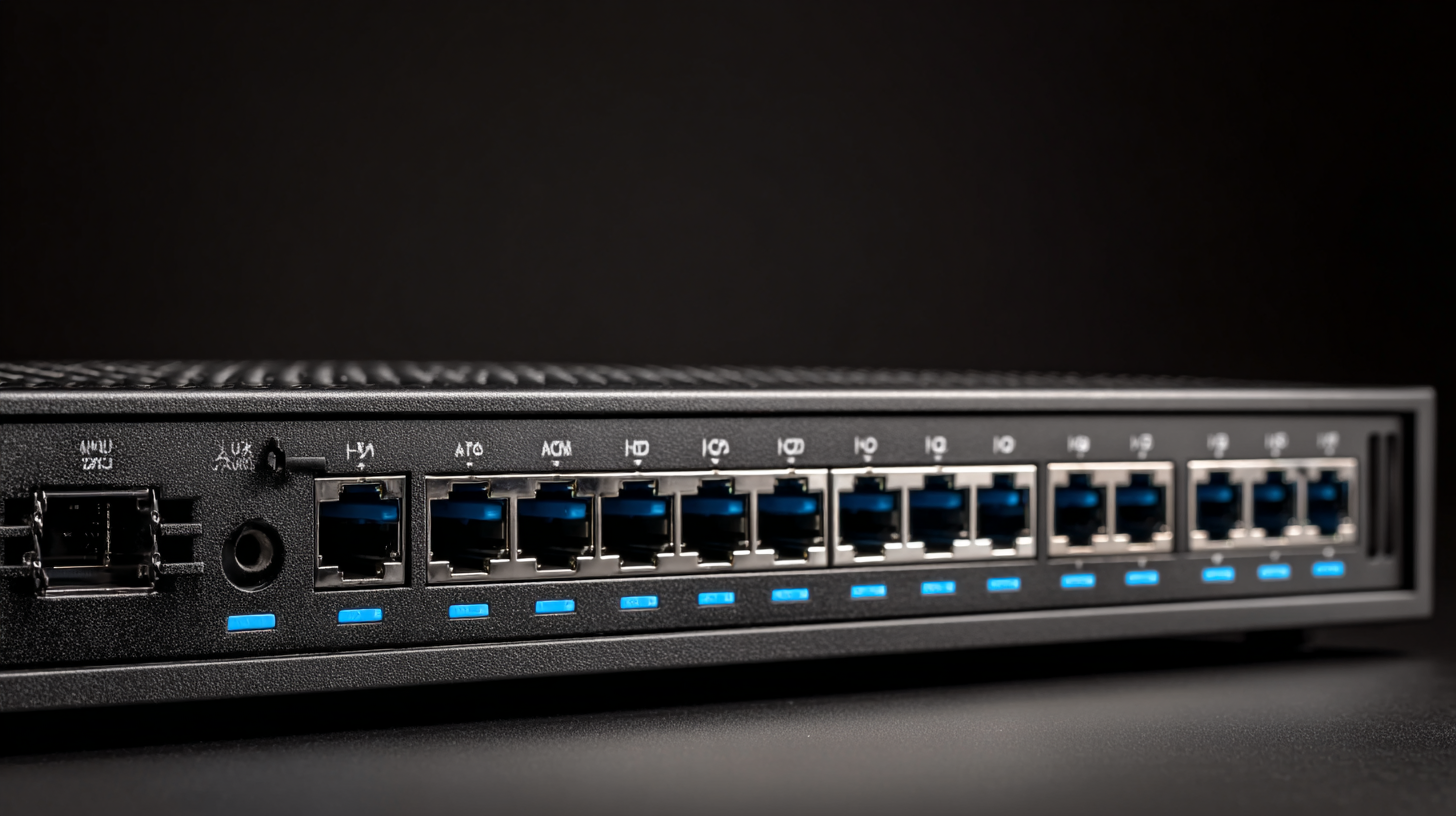In the rapidly evolving digital landscape, the demand for high-performance routers is at an all-time high, driven by the exponential growth of data traffic and the increasing number of connected devices. According to a report by IDC, global data traffic is projected to reach 47 zettabytes by 2025, further emphasizing the necessity for robust networking solutions. Selecting the right manufacturer for high-performance routers involves not only assessing performance specifications and features but also considering after-sales service advantages and repair costs. A study by Gartner highlights that organizations lose an average of $1.5 million annually due to inadequate infrastructure support, underscoring the importance of a reliable manufacturer that can provide ongoing maintenance and support. When businesses prioritize these factors, they can ensure optimal performance and longevity of their networking equipment, ultimately leading to improved operational efficiency and customer satisfaction.

When selecting a high-performance router manufacturer, it's essential to identify the key characteristics that set industry leaders apart. According to a recent report by the International Data Corporation (IDC), the global market for high-performance networking equipment is expected to reach $87 billion by 2025. This rapid growth underscores the importance of choosing a manufacturer that not only meets current technological demands but is also equipped to adapt to future innovations.
One significant characteristic to consider is the manufacturer's commitment to quality and reliability. Research by Gartner shows that 80% of IT leaders prioritize vendor stability and service reliability when making purchasing decisions. Additionally, high-performance routers should adhere to industry standards such as IEEE 802.11ax (Wi-Fi 6), which enhances network efficiency and performance. A manufacturer that actively participates in standard-setting organizations, such as the Institute of Electrical and Electronics Engineers (IEEE), demonstrates its dedication to leading-edge technology and compliance with best practices in the industry. Therefore, thorough evaluation of a manufacturer's credentials, product certifications, and market reputation is vital when making an informed decision.
This chart compares key characteristics of high-performance router manufacturers based on industry standards.
When selecting a manufacturer for high-performance routers, understanding industry standards for quality assurance is crucial. According to a report by the International Telecommunication Union (ITU), routers must comply with specific performance benchmarks, such as latency, bandwidth, and packet loss rates, to ensure optimal functionality in various networking applications. The IEEE 802.11ax standard, for instance, emphasizes improved efficiency and throughput, which has become a benchmark for manufacturers aiming to produce competitive products in the ever-evolving tech landscape.
Furthermore, adherence to standards set by organizations like the American National Standards Institute (ANSI) and the Institute of Electrical and Electronics Engineers (IEEE) can significantly influence the reliability of router production. A recent study from the Network Equipment Manufacturers Association (NEMA) indicated that devices produced under these strict quality protocols demonstrated up to 30% longer lifespans and reduced failure rates, providing substantial value to end-users. Therefore, selecting a manufacturer that prioritizes compliance with these industry standards not only enhances product performance but also assures long-term customer satisfaction and trust in the technology.
| Manufacturer Location | ISO Certification | Production Capacity (units/month) | Average Lead Time (weeks) | Quality Assurance Standards |
|---|---|---|---|---|
| North America | ISO 9001, ISO 14001 | 150,000 | 4 | 6 Sigma, IPC Standards |
| Europe | ISO 9001 | 100,000 | 6 | RoHS Compliant, CE Mark |
| Asia | ISO 9001, ISO 27001 | 300,000 | 3 | IPC-A-610, JIS Standards |
| South America | ISO 9001 | 50,000 | 5 | ANSI Standards |
 In today's highly competitive technology landscape, selecting the right manufacturer for high-performance routers requires a meticulous evaluation of their manufacturing processes and technologies. Understanding how these processes align with industry standards is crucial for ensuring optimal performance. This involves looking into the entirety of the production lifecycle, from the sourcing of materials to the implementation of quality control measures. Manufacturers that prioritize transparency and demonstrate adherence to established benchmarks are more likely to produce routers that not only meet but exceed market expectations.
In today's highly competitive technology landscape, selecting the right manufacturer for high-performance routers requires a meticulous evaluation of their manufacturing processes and technologies. Understanding how these processes align with industry standards is crucial for ensuring optimal performance. This involves looking into the entirety of the production lifecycle, from the sourcing of materials to the implementation of quality control measures. Manufacturers that prioritize transparency and demonstrate adherence to established benchmarks are more likely to produce routers that not only meet but exceed market expectations.
Additionally, integrating advanced technologies into manufacturing can greatly enhance the performance of these networking devices. For instance, the adoption of automation and precision engineering techniques can reduce errors and improve efficiency. Furthermore, embracing innovative practices such as agile development and rapid prototyping allows manufacturers to respond swiftly to market demands and technological advancements. As the router market continues to evolve, those companies that invest in robust manufacturing processes and keep pace with technological innovations will position themselves as leaders in delivering high-performance solutions that align with the ever-changing needs of consumers and businesses alike.
When selecting a manufacturer for high-performance routers, assessing customer service and support is crucial. A reliable manufacturer understands that routers are the backbone of network connectivity and that any downtime can lead to significant operational disruptions. Therefore, effective customer support must be a top priority. This includes responsive technical support teams available through various channels—phone, chat, and email—who can swiftly address issues as they arise. Additionally, manufacturers that offer extensive online resources, such as tutorials, FAQs, and troubleshooting guides, empower users to solve problems independently while enhancing their overall experience.
Moreover, the post-purchase support offered by a router manufacturer is equally important. This consists of regular firmware updates, ensuring that routers remain compliant with the latest security standards and performance metrics. Manufacturers that provide proactive communication regarding these updates demonstrate their commitment to customer satisfaction. Furthermore, a solid warranty and return policy also reflect a manufacturer's confidence in their product quality and customer care philosophy. Buyers should prioritize manufacturers that excel in support, as this can lead to smoother operations and a better return on their investment in high-performance networking solutions.

When selecting a manufacturer for high-performance routers, the importance of certifications and compliance cannot be overstated. These certifications not only validate the quality of the products but also ensure they meet industry standards, such as those set by the Institute of Electrical and Electronics Engineers (IEEE) and the Internet Engineering Task Force (IETF).
According to a report by MarketsandMarkets, the global network equipment market is projected to reach $55 billion by 2025, highlighting the increasing reliance on robust and compliant networking equipment.
Certifications such as ISO 9001 for quality management systems and CE marking for conformity with health, safety, and environmental protection standards are critical indicators of a manufacturer’s commitment to excellence. In particular, routers with compliance to Federal Information Processing Standards (FIPS) are essential for government and heavily regulated industries, ensuring that the products can withstand stringent security requirements.
A report from Gartner noted that companies employing compliant networking solutions saw a 30% reduction in downtime and an increase in overall performance, emphasizing how manufacturer credibility translates into operational success.


